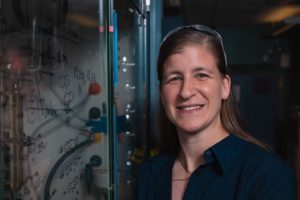Read Beth’s Emerging Investigator article, Synthesis and characterization of a ruthenium-containing copolymer for use as a photoredox catalyst, DOI D3PY00428G.
Read our interview with Beth below:
How do you feel about Polymer Chemistry as a place to publish research on this topic?
Our group works on a diverse array of research that spans over polymer chemistry, organic synthesis, and catalysis. We often feel that the broad readership of Polymer Chemistry comprises scientists that are interested in all aspects of our group’s work which is often centered in fundamental polymer synthesis and a little less on applications. Thus, it is often a perfect place to submit papers that we feel are exciting from an overall polymer perspective and we know the readership will benefit from these findings.
Can you share one piece of career-related advice or wisdom with other early career scientists?
Honestly, all of our group’s main projects have been things that were not necessarily in my wheelhouse when I started academia. With that said, I think my advice would be to not shy away from learning new things that are exciting you and/or your group. New areas and directions can always be bolstered by collaborations and discussions with colleagues as well. It’s genuinely more fun to do the science that excites you and have that be boundless (within reason of course), then it is to feel limited by your background or exposure.
Keep up to date with all of Beth’s research by going to her website or following her on X @beth_elacqua.











